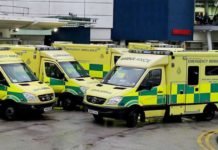“I wish to inform the House of a serious failure that has come to light in NHS breast screening England.
Earlier this year we found that between 2009 and 2018 an estimated 450,000 women were not invited to their breast screening.
There are likely to be women who would still be alive in this group if this failure had not happened.”
Shadow Health Secretary Jonathan Ashworth: “I thank the Secretary of State for advance sight of his statement and for his personal courtesy in directly briefing me as well. The thoughts of the whole House are with those whose screening was missed and who sadly lost their lives from breast cancer, or who have subsequently developed cancer. Anyone who has had a loved one taken by breast cancer, or indeed any cancer, will know of the great pain and anguish of that loss. I understand that the Secretary of State has referred to estimates, but when the facts are established, will he assure us that each and every case will be looked into sensitively and in a timely manner? Our thoughts also turn to the 450,000 women who were not offered the screening that they should have had, so I welcome the Secretary of State’s commitment to contact the 309,000 women who are estimated to be still alive.
Early detection and treatment are vital to reducing breast cancer mortality rates, which is why the AgeX pilots were established in 2009 and rolled out nationally from late 2010, when the Government expanded the screening programme. Given the problems that Public Health England has identified with its randomisation algorithm for those trials, will the Secretary of State tell us whether any evaluations and assessments of those pilots had been done by the Department before the national roll-out of the programme?
I welcome the Secretary of State’s candour in questioning why this problem was not picked up—eight years is a long time for an error of this magnitude to go undetected. Did the Department receive any warnings in that time? Is there any record of how many women raised concerns that they had not received the appropriate screening? Were there any missed opportunities to correct this mistake? He said graciously that oversight of the screening programme was not good enough. How does he intend to improve that oversight? What other trials are in place across the NHS and is he satisfied with their oversight?
We welcome the establishment of the national inquiry. Will it be hosted and staffed by the Department of Health or another Department? In the interests of transparency, will the Secretary of State place in the Library the Public Health England analysis from this year that identified the problem with the algorithm? Although the parallels are not exact, where the NHS offers bowel cancer screenings for women between the ages of 60 and 74 and cervical cancer screenings for women up to 64, what assurances can he give that the systems supporting those services are running properly, and what checks are being carried out to make sure that nobody misses out on screenings for other cancers?
The Secretary of State says that NHS England will take steps to expand the capacity of screening services. Will he say a little more about that? What extra resources will be made available to help the NHS provide the extra screening now needed? He will know that the NHS faces huge workforce pressures—according to Macmillan, there are more than 400 vacancies in cancer nursing, the Royal College of Radiologists has found that 25% of NHS breast screening programme units are understaffed, and there are vacancies for radiographers too. Will he assure us that the NHS will have the staff to carry out this extra work, and may I gently suggest that, if it needs extra international cancer staff, he ensures that the Home Office does not block their visas?
More broadly, does the Secretary of State share my concerns that screening rates are falling generally? The proportion of women aged 50 to 70 taking up routine breast screening invitations fell to 71.1% last year—the lowest rate in the last decade. There is also a wide regional variation in screening rates. The number of women attending breast screening in England is as low as 55.4% in some areas, and, as the all-party group on breast cancer found, there are stark inequalities in NHS services in England, with women in the worst-affected areas more than twice as likely to die from breast cancer under the age of 75. Beyond the problems identified today, what more are the Government doing to make sure that screening rates rise again so that cancer care for patients is the best it can be?
Finally, many of our constituents over whom breast cancer has cast a shadow will feel anxious and worried tonight. Members on both sides of the House want to see cancer prevented and those who have it fully supported. Transparency and clarity are vital. Will the Secretary of State undertake to keep the House fully informed of developments to offer our constituents the peace of mind they deserve?”
This is a "Pay as You Feel" website Please help keep us Ad Free.
You can have access to all of our online work for free. However if you want to support what we do, you could make a small donation to help us keep writing. The choice is entirely yours.























